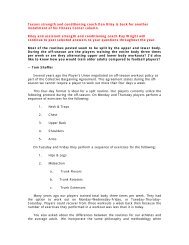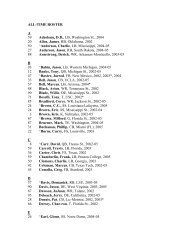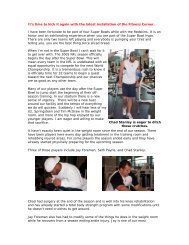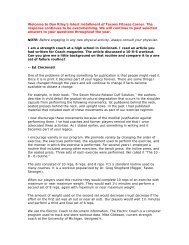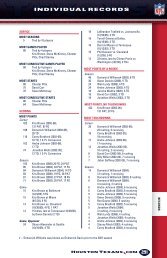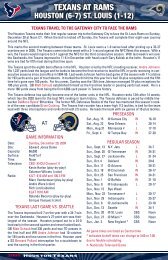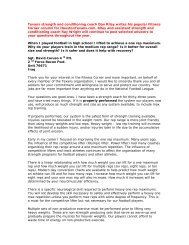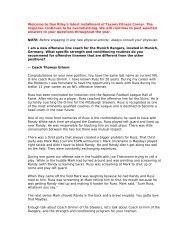Texans strength and conditioning coach Dan Riley has compiled a ...
Texans strength and conditioning coach Dan Riley has compiled a ...
Texans strength and conditioning coach Dan Riley has compiled a ...
You also want an ePaper? Increase the reach of your titles
YUMPU automatically turns print PDFs into web optimized ePapers that Google loves.
With the same amount of work <strong>and</strong> effort, a teenager will generate better gains from<br />
one year to the next. They will lift more weight <strong>and</strong> gain more lean weight when they<br />
turn sixteen than when they turned fifteen, simply because they are more mature.<br />
Overeat<br />
Over fatness <strong>and</strong> obesity are currently huge health concerns. Having a teenager gain<br />
twenty pounds of fat over the summer to make his parents <strong>and</strong> <strong>coach</strong> happy is<br />
criminal. Young teenagers are preoccupied with bodyweight. They must be taught<br />
weight (on a scale) is not the issue. The only issue is how much is lean bodyweight<br />
<strong>and</strong> how much of the weight increase is fat.<br />
If anyone (to include a young teenager) consumes more calories than he burns off, it<br />
will be converted to fat. Adding any extra fat is foolish. He will soon become a fat<br />
teenager <strong>and</strong> eventually a fat adult. He will then join a large group of fat adults who<br />
have health problems <strong>and</strong> are currently trying to lose weight (fat).<br />
Strength Training<br />
As a parent or <strong>coach</strong> it may be difficult to tell a frustrated young teenager he may<br />
never weigh more than 150 pounds in a lean muscular condition. We encourage all<br />
young athletes to work hard but they must realize everyone <strong>has</strong> physical assets <strong>and</strong><br />
limitations. We can’t change our genetic profile. Very few people have great potential<br />
for adding a significant amount of muscle, especially young <strong>and</strong> physically immature<br />
teenagers. We can’t make our body add ten pounds of muscle if it is genetically<br />
limited to adding five pounds of muscle.<br />
When we give advice to young athletes we ask them, “Are you doing everything<br />
necessary to generate the physical gains you are capable of making” Many young<br />
athletes want the best results but aren’t willing to sustain the long-term discipline<br />
needed to reach their physical potential. We stress the following:<br />
1. Balanced Nutrition<br />
2. Balanced Strength Program<br />
3. Adequate Rest<br />
Balanced Nutrition<br />
Seek the advice of a Registered Dietitian. Have a food analysis done to determine<br />
any deficiencies <strong>and</strong> to also determine the number of calories needed daily to<br />
generate the best muscular gains.<br />
We have observed many young athletes that have poor <strong>and</strong> inconsistent eating<br />
habits. They skip meals, don’t eat breakfast, sleep in on weekends (miss meals),<br />
don’t eat a balanced diet, <strong>and</strong> consume fewer calories than are needed to generate<br />
potential <strong>strength</strong> gains. They complain about not making good gains yet are not<br />
willing to sustain the discipline to stimulate maximum gains.<br />
We have used a formula to help young athletes establish a starting point regarding<br />
how many calories need to be consumed daily. For some it may be too much <strong>and</strong><br />
others not enough. It is a starting point until you can have your resting metabolism



